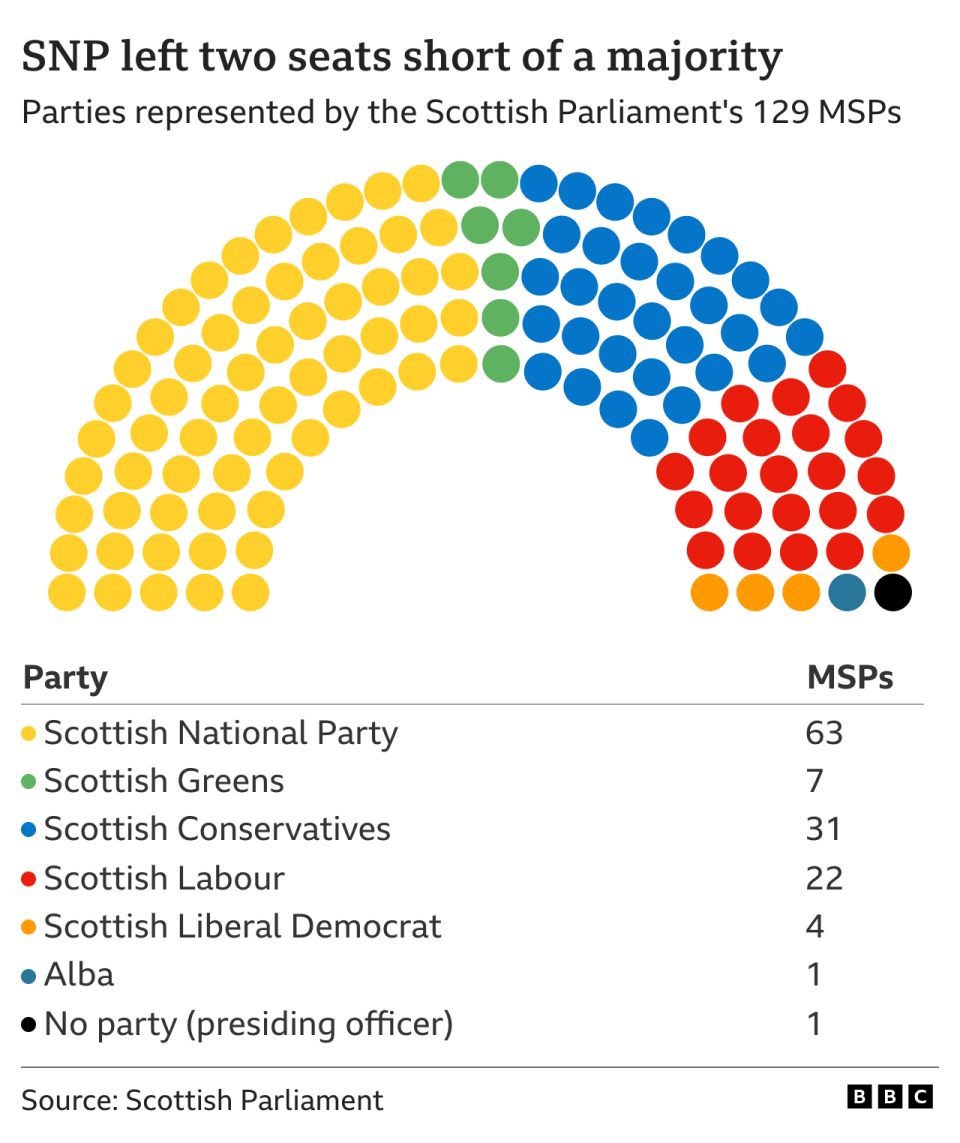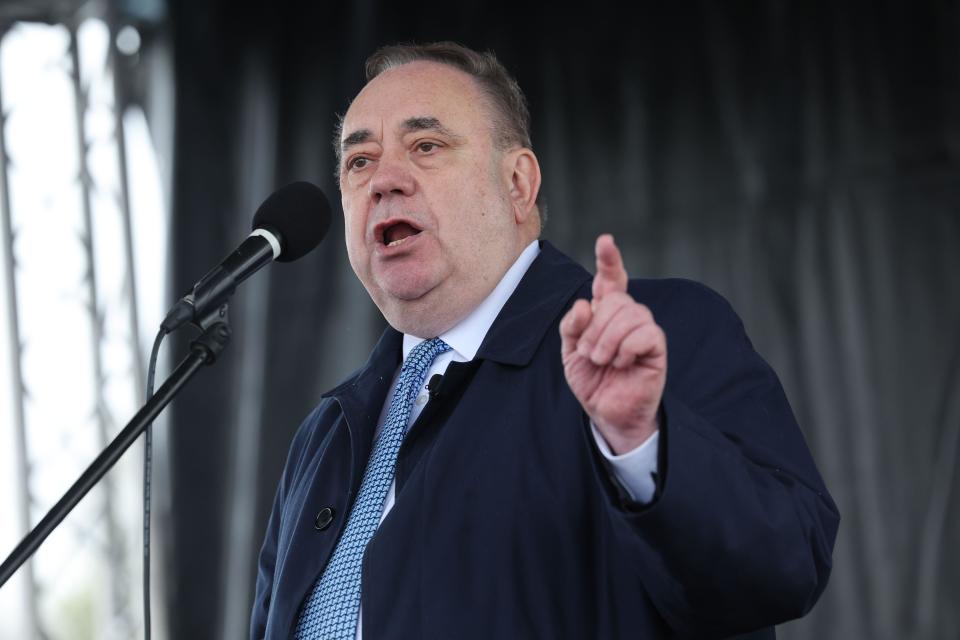Yousaf considers quitting as Scotland's first minister
- Oops!Something went wrong.Please try again later.
- Oops!Something went wrong.Please try again later.
Humza Yousaf is considering quitting as Scotland's first minister rather than face two confidence votes, BBC News understands.
A source close to Mr Yousaf said that resignation was now an option but a final decision had not yet been taken.
"The clock has been ticking ever downwards," the source told the BBC on Sunday night.
Mr Yousaf has faced a fight for survival as first minister after abruptly ending the SNP's power-sharing deal with the Scottish Greens last Thursday.
He is understood to have ruled out a deal with Alex Salmond's Alba party, and his prospect of surviving a vote of no confidence in his leadership is now dependent on the Scottish Greens.
He needs the support of at least one member of the opposition at Holyrood to survive the vote, which could take place as early as Wednesday.
The parliamentary bureau, made up of the presiding officer and MSPs from the main parties, will decide this week when the vote takes place and normally gives two days notice.
Jettisoning the deal with the Greens, known as the Bute House Agreement, provoked a furious reaction from his former partners in government.
He now faces two motions of no-confidence this week, one tabled by the Scottish Conservatives in his own leadership as first minister and another from Scottish Labour which would force his entire government to resign.
The Greens are due to meet later on Monday but have repeatedly ruled out supporting him in the personal vote.
The Scottish Conservatives, Labour and the Liberal Democrats have already said they will vote against him.
If nothing changes, that leaves the first minister facing a choice of defeat in a confidence vote or resignation in advance.

The SNP has 63 MSPs in the 129 seat parliament, so if the seven Green MSPs vote against him, he is reliant on support from the sole Alba party MSP Ash Regan to continue in his role.
That would lead to a 64:64 tied vote in which case the presiding officer would be expected to vote to maintain the status quo.
The motion of no confidence in him personally is not binding but if he lost he would come under intense pressure to step down.
If he lost the government vote, MSPs would have 28 days to vote for a new first minister or automatically trigger a Scottish parliamentary election.

Alba, a rival pro-independence party led by former first minister Alex Salmond, has been outlining a list of demands that might persuade Ms Regan to support the first minister.
At an emergency meeting on Sunday, Alba's governing body formally approved Ms Regan's plan to pursue the issues of independence, "women's rights" and the "restoration of competent government" in any negotiations.
Mr Salmond told BBC News he was also looking for a move away from "the culture wars" and a shift towards the "people's priorities," which he said were health, housing, transport, education and the economy.
He said he expected Ms Regan to hold talks with Mr Yousaf in the coming days.
But a deal with Mr Salmond's party is opposed by many within the SNP, and could open up further internal divisions.
A source close to Mr Yousaf told the BBC on Sunday evening "there is going to be no deal," with Alba.
The Scottish government has not confirmed a time for any meetings with opposition figures or even that they will definitely go ahead.
Weakened authority
Two SNP MPs, Stewart McDonald and Pete Wishart, have come out publicly against the idea of a deal with Alba.
One senior SNP figure told BBC News it would be intolerable for any SNP leader to be beholden to Mr Salmond, whose estrangement from the party he twice led is a source of bitterness all round.
Even if he were to survive the vote of no confidence, Mr Yousaf's authority would be badly weakened.
Liz Lloyd, who was chief of staff to Nicola Sturgeon when she was first minister, pointed out that while Mr Yousaf might himself survive on a tie, legislation including budgets "can't pass without a majority" in the Scottish Parliament.
In other words, even if Mr Yousaf were able to continue in office with the support of his own MSPs plus Ms Regan, without votes from elsewhere in the chamber, he would struggle to govern.
The BBC has been told that there were talks between the SNP leadership and the Green leadership over the weekend but that they did not alter the Greens' position.
Nor did the SNP's former Westminster leader, Ian Blackford, apologising to them on the BBC's Sunday with Laura Kuenssberg.
Co-leader Lorna Slater who, along with Patrick Harvie, was dismissed as a minister in Mr Yousaf's government at a short and "pretty robust" meeting in the first minister’s official residence, Bute House, early on Thursday morning, told The Sunday Show on BBC Scotland that the first minister "has lost our confidence and lost our trust."
She added: "I cannot imagine anything at this point that could change that position."
The Greens are due to convene on Monday to decide whether or not to even accept Mr Yousaf's invitation to a meeting.
They had been scheduled to meet next month to decide whether or not to continue in the power-sharing deal with the SNP after discontent among members about changes to gender healthcare and the abandonment of a key climate change target.
Some Greens have expressed concerns that the Scottish government is considering implementing the recommendations of the Cass review on English gender healthcare.
A critic of the Greens' approach to that issue, and others, is Kate Forbes, the former finance secretary, a social conservative who came close to defeating Mr Yousaf in last year's leadership contest and could run again if he stands down.
Ms Forbes insisted this week that she was backing Mr Yousaf but she has used similar language to Mr Salmond's about "getting back to the people’s priorities," such as creating wealth, improving education and fixing healthcare.
As the leadership election demonstrated, thousands of party members do not appear to be put off by her personal objection to gay marriage and opposition to abortion.
However, those positions are deeply unpopular within the progressive wing of the SNP and she might find it difficult to unite the party and to run a minority government, especially if she were dependent on the Greens for support.
Other names being floated as potential replacements for Mr Yousaf are Education Secretary Jenny Gilruth, Culture Secretary Angus Robertson, Health Secretary Neil Gray and Economy Secretary Màiri McAllan.
With the Greens apparently standing firm, and the SNP’s leadership’s reluctance to engage with Alba, Mr Yousaf may yet resign rather than endure the humiliation of losing a confidence vote.
One source close to the first minister said the end of his time in office appeared to be approaching and that, by sacking the Greens, he had gambled and lost.

